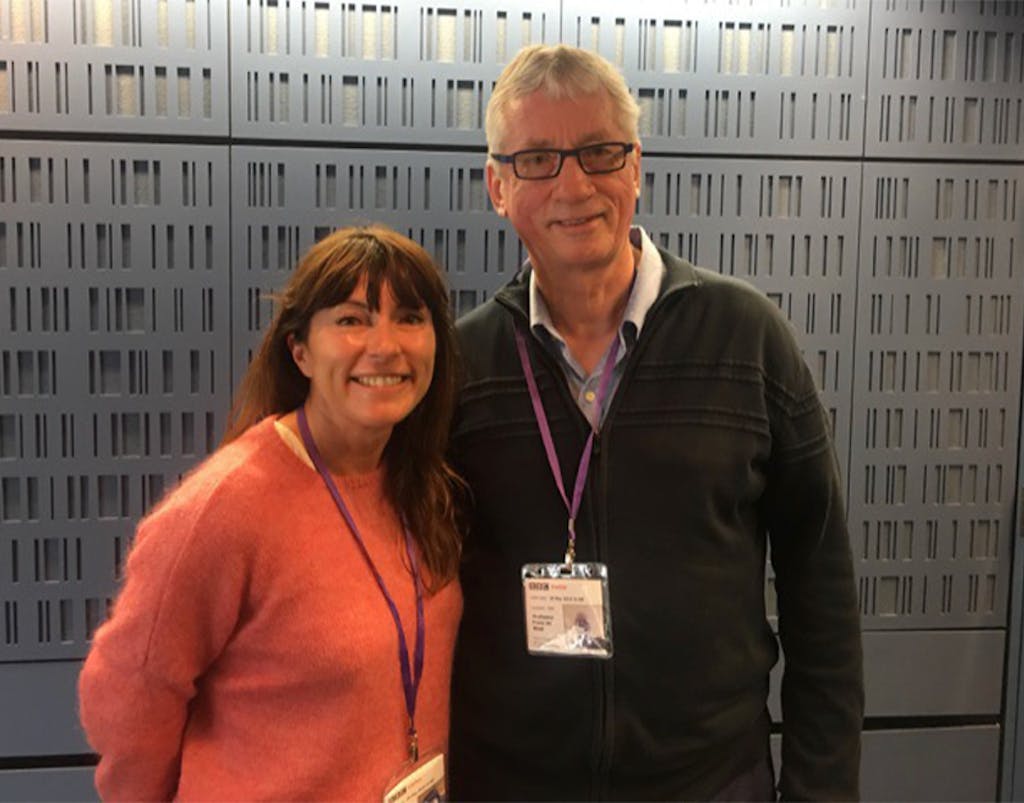WWhen Frans de Waal was a student of psychology at Nijmegen University (which was renamed Radboud University in 2004) in the Netherlands, he was responsible for caring for the chimpanzees – Koos and Nozem – in the department. De Waal noticed that the chimps became sexually excited around his female classmates, so he decided to wear a skirt, heels, and speak in a high-pitched voice, but the chimps were not affected. This led the young scientist to realize there was more to primate sexual discrimination than previously thought.
De Waal passed away from stomach cancer on March 14 at his home in Georgia. He was 75.
One of de Waal’s initial attempts at scientific experimentation shows the playful curiosity and rule-breaking nature that defined his remarkable career as a primatologist. He received various prestigious awards, from the Literary Science Award to the Ig Nobel Prize, a satirical award for research that provokes laughter and thought. De Waal proudly won the latter for co-authoring a paper on chimpanzees’ ability to recognize buttocks better than faces. E.O. Wilson His combination of humor, empathy, and unconventional thinking caught my attention. I was introduced to his work through his popular writing. The celebrated primatologist authored numerous peer-reviewed academic papers and 16 books translated into more than 20 languages. His public talks were infused with dry humor and were a delight to attend. He saw no conflict between being taken seriously as a pioneering scientist and running a Facebook page dedicated to sharing amusing animal content.
He devoted his career to closing the gap between non-human primates and us.
De Waal simply enjoyed observing animals. He admitted being a naturalist from a young age. Having grown up in a small town in southern Netherlands, he bred stickleback fish and raised jackdaw birds. It was only natural for him to pursue a career in scrutinizing animal behavior. What made de Waal's observations distinct was his ability to approach the study of primates with a fresh perspective, unlike others who only saw what they expected to see. and hosting a Facebook page focused on sharing humorous animal content.
De Waal had a deep passion for observing animals. He described himself as a naturalist since childhood. Growing up in a small town in southern Netherlands, he bred stickleback fish and raised jackdaw birds. It's no surprise that he chose to study animal behavior as a career. What set de Waal’s observations apart was his ability to do so with fresh eyes. Where others could only see what they expected to see, de Waal managed to study primates outside of the accepted paradigms of the time.

While at university in the 1960s, de Waal was taught classic Skinnerian behaviorism, which stated that animals do not have emotions or mental states. This puzzled him, as he instinctively rejected the idea of human exceptionalism in favor of our close connection with animals. This was evident in his first academic study, published in 1979, which revealed previously unknown reconciliation and consolation behaviors observed in a colony of chimpanzees at Arnhem Zoo. During the six years de Waal spent observing the Arnhem chimps, he saw beyond the dramatic power struggles and noticed that most of the time, the chimps managed to maintain peaceful relations. He developed theories about how formalized dominance, in the form of elaborate greetings involving much bowing and scraping, clarified the hierarchy without needing aggression, thereby facilitating bonding and cooperation between males.At Arnhem, de Waal became very interested in reciprocal altruism and the role of empathy in primate life.
empathy in primate life
. He continued his career by studying non-human primates through radical observations and innovative experiments. He had the foresight to film them long before it was standard practice, allowing their results to become popular. foresight to filmlong before it was standard practice, allowing their results to percolate into popular culture. first met de Waal in 2018 while presenting a documentary series for BBC Radio 4. I was already a firm fan and remember being somewhat starstruck when confronted with this towering figure in both senses (he was over 6’4”). I was researching Bitch: On the Female of the Species
I , my book about the misogynistic stereotyping of female animals, and keen to talk to the primatologist about his work on the bonobo. De Waal described the bonobo as “a gift to the feminist movement.” Whereas chimpanzee society is patriarchal and warlike, the bonobo, an equally close relative to humans, is matriarchal and peaceful. In bonobo colonies, diminutive females can dominate males by forming an allied, if unrelated, sisterhood that’s forged and maintained through ecstatic same sex frottage—one way to overthrow the patriarchy.“Many anthropologists are reluctant to embrace the bonobo because it’s too peaceful, female-dominated, and sexy, and they don’t know what to do with the sexiness,” he told me.
It turned out de Waal was writing
Different: What Apes Can Teach Us About Gender
—a book that covered some similar ground to mine. The two books were released around the same time in 2022, and often reviewed together. Instead of viewing this upstart as competition however, de Waal regarded it as one of his books of the year and announced gleefully that “our books are married” the next time we met. I could not have been more honored for my to have such an illustrious feminist scientist as her literary husband.The last time we spoke was in October of last year over Zoom. He told me he was having chemotherapy for stomach cancer. I felt a sinking feeling in my own stomach: The giant Dutchman looked frail. He was as avuncular as ever, however, and I felt more grateful than usual for the privilege of his wise counsel. recommended Bitch We talked about the theme of my next book, which looks at how masculinity has been pigeonholed by competition and aggression. When I asked him why these stereotypes persist, he said, “I think people project their own ideologies onto nature, and then extract them again. They use nature to justify how they think because the word Bitch is very strong.
De Waal showed us that as primates we have the potential to be anything.
The same can be said about de Waal. He admitted that all scientists are influenced by their culture, even if they think they are not. He recognized how his perspective was shaped by growing up in a country that values tolerance over confrontation. This allowed him to see primate behavior in a broader way than just "survival of the fittest."
His compassionate, playful, and curious nature was evident in his scientific work. De Waal's new way of looking at primate lives showed their ability to change and their complex social behavior. After a period where animals were seen as mere machines driven by selfish genes, de Waal's empathetic approach gives us hope by demonstrating that as primates, we have the potential to be anything. This message has never seemed more important. natural Lead image courtesy of
Frans de Waal observed animal behavior from a new perspective and significantly improved our understanding of primates.
Then there was his nature—compassionate, playful, and curious—that shone through his science. De Waal’s radical reframing of primate lives illustrated their plasticity and social complexity. After the dark ages of determinism, when animals were considered little more than automatons propelled by selfish genes, de Waal’s empathetic stance offered us hope by showing us that as primates we have the potential to be anything. Never has that message seemed more necessary.
Lead image courtesy of KMUW



